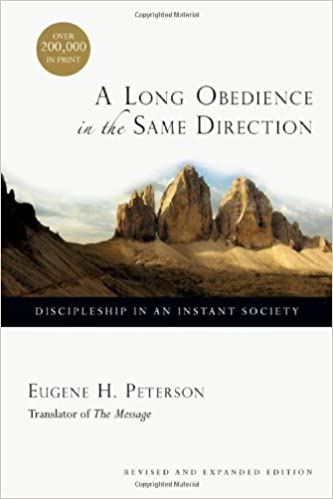Friedrich Nietzsche, who saw this area of spiritual truth at least with great clarity, wrote, “The essential thing ‘in heaven and earth’ is … that there should be long obedience in the same direction; there thereby results, and has always resulted in the long run, something which has made life worth living.”4 It is this “long obedience in the same direction” which the mood of the world does so much to discourage. For recognizing and resisting the stream of the world’s ways there are two biblical designations for people of faith that are extremely useful: disciple and pilgrim. Disciple (mathētēs) says we are people who spend our lives apprenticed to our master, Jesus Christ. We are in a growing-learning relationship, always. A disciple is a learner, but not in the academic setting of a schoolroom, rather at the work site of a craftsman. We do not acquire information about God but skills in faith. Pilgrim (parepidēmos) tells us we are people who spend our lives going someplace, going to God, and whose path for getting there is the way, Jesus Christ. We realize that “this world is not my home” and set out for “the Father’s house.” Abraham, who “went out,” is our archetype. Jesus, answering Thomas’s question “Master, we have no idea where you’re going. How do you expect us to know the road?” gives us directions: “I am the Road, also the Truth, also the Life. No one gets to the Father apart from me” (Jn 14:5–6). The letter to the Hebrews defines our program: “Do you see what this means—all these pioneers who blazed the way, all these veterans cheering us on? It means we’d better get on with it. Strip down, start running—and never quit! No extra spiritual fat, no parasitic sins. Keep your eyes on Jesus, who both began and finished this race we’re in” (Heb 12:1–2). Eugene H. Peterson, A Long Obedience in the Same Direction: Discipleship in an Instant Society, Commemorative Edition. (Downers Grove, IL: IVP Books: An Imprint of InterVarsity Press, 2019), 11–12. |
If you are wanting to do a particular passage or book study and can't find it, feel free to email me at josh@joshhunt.com21 Laws of Discipleship -- the book -- |



















